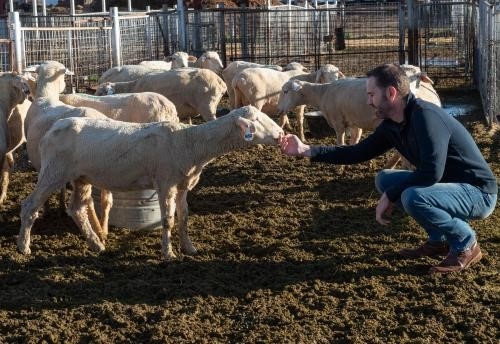Healthy placental development key to healthy offspring
Research into placental dysfunction aims to help human and livestock health.
April 8, 2020

Most expectant mothers know that a placenta is something that forms around fetuses to nourish and protect them. However, what they may not realize is that a placenta is considered an organ that appears only during pregnancy.
Ryan Ashley, associate professor of animal science in the New Mexico State University College of Agricultural, Consumer & Environmental Sciences, is exploring placental development and ways of preventing placental dysfunction, which leads to pregnancy complications in both humans and livestock. He also is researching the role of a progesterone receptor commonly seen in the development of cancerous breast tumors, since placental development actually shares several similarities with how tumors form.
“When we look at some of the key events of what has to happen when the placenta forms, it’s really interesting how similar it is to how a tumor forms,” Ashley said.
He added that an interesting aspect of placental development is how trophoblast cells (those that provide nutrients to the developing embryo) undergo a high rate of mitosis, essentially actively dividing and trying to invade tissue inside a mother’s uterus to attach and begin placental development. Meanwhile, these trophoblast cells can avoid attacks from the mother’s immune system.
“If we think about the cells of the embryo, these cells have different genetic makeups,” Ashley said. “The mom’s genome in her uterus is actually quite different from the embryo because the embryo got half of its DNA from mom and the other half from dad. So, there’s always been this question in the reproductive field of why the mom’s immune system does not attack that embryo, because in essence, this would really be a foreign object the immune system should try to get rid of.”
While Ashley’s research aims to help women experience successful pregnancies, he is conducting his studies on sheep, which experience a similar placental development to people. This also means he can explore ways of helping livestock carry out successful pregnancies and help avoid future health problems in both humans and animals.
“We now know that the offspring that result from placental dysfunction are at increased risk for type 2 diabetes, obesity, stroke and cardiovascular disease. All of these health problems have some correlation with how well that placenta formed and functioned in utero,” Ashley said. “That concept -- that the placenta can not only impact the health of mom and baby during the pregnancy but can also impact that individual later in life -- I think really underscores just how important the placenta is.”
To determine how to maintain placental health, Ashley has referred to cancer studies to figure out how cells function in the placenta. He has focused on the CXCR4 receptor, which is commonly seen in various types of cancers. He also has focused on an Food & Drug Administration-approved compound called AMD3100, which acts as an antagonist to inhibit the functions of the CXCR4 receptor.
“We’re using the same compound to inhibit the receptor in sheep during the time the placenta is forming to try to determine the role this particular receptor is playing,” he said. “This receptor is playing pretty important roles in vascularization, immune cell recruitment -- a lot of things that are important in how the placenta forms.”
Ashley said he hopes his research using sheep helps answer questions both from the biomedical research side to help women who are struggling with carrying a successful pregnancy and also from the agricultural side.
“In couples who are struggling to have children, women most often will lose their pregnancy early in gestation,” he said. “It’s the same thing with livestock. Cattle, pigs, sheep and goats most often lose their offspring early in gestation. Pregnancy loss is a major factor affecting the livestock industry and, thus, economic efficiency in livestock meat and milk production. Placental dysfunction is a frequent source of pregnancy loss in livestock and humans, but the underlying causes of impaired placental function are not well characterized. To dually improve animal and human health as well as farm animal production, it is imperative to elucidate the mechanisms causing impaired placental development.”
You May Also Like



